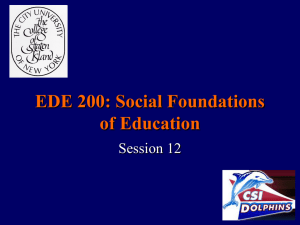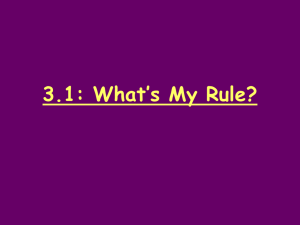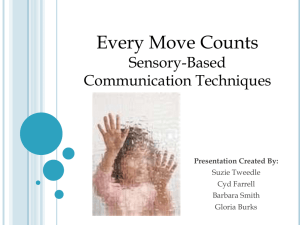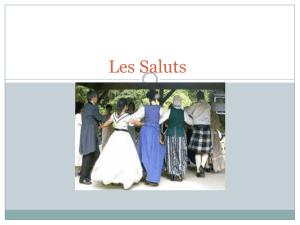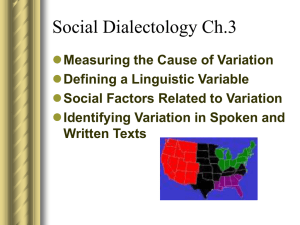Culture Counts - US Psychiatric Rehabilitation Association
advertisement
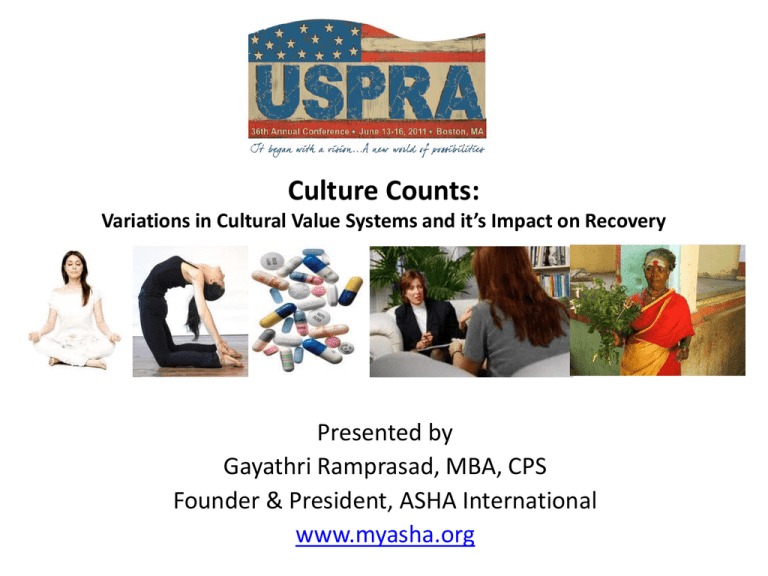
Culture Counts: Variations in Cultural Value Systems and it’s Impact on Recovery Presented by Gayathri Ramprasad, MBA, CPS Founder & President, ASHA International www.myasha.org Culture Counts: Variations in Cultural Value Systems and it’s Impact on Recovery Learning Objectives: Explore concepts of culture, cultural legacies, social inheritance, and power distance index East vs. West: Explore variations in cultural value systems and its impact on recovery Learn 3 steps to create culturally-responsive, personcentered, recovery-oriented, holistic systems of care GR - USPRA 2011 2 Culture Counts: Variations in Cultural Value Systems and it’s Impact on Recovery Culture: Culture is a shared, learned, symbolic system of values, beliefs and attitudes that shapes and influences perception and behavior – an abstract "mental blueprint" or "mental code." GR - USPRA 2011 3 Culture Counts: Variations in Cultural Value Systems and it’s Impact on Recovery Cultural Legacies: Cultural legacies are powerful forces. They have deep roots and long lives. They persist, generation after generation, virtually intact, even as the economic, social, scientific and demographic conditions that spawned them have vanished, and they play such a role in directing attitudes and behavior that we cannot make sense of our world without them. These attitudes and behaviors are passed on from generation to generation through social inheritance. GR - USPRA 2011 4 Culture Counts: Variations in Cultural Value Systems and it’s Impact on Recovery Culture impacts overall wellbeing: Culture is central to recovery. A person’s cultural legacy influences how they perceive mental illness and how much stigma they attach to it. Culture also influences whether or not a person seeks help, when and where they seek help, their social supports and coping skills. GR - USPRA 2011 5 Culture Counts: Variations in Cultural Value Systems and it’s Impact on Recovery East vs. West: A Cross-Cultural Perspective Eastern (agricultural) Systems: Traditional Society Values Western (industrialized) Systems: Modern Society Values Family/group oriented Individual oriented Extended family Nuclear/blended family Multiple parenting Primary relationship: Marital bond Emphasis on interpersonal relationship & harmony Emphasis on self-fulfillment and self-development Well-defined family member’s roles Flexible family member’s roles SOURCE: Asian American & Pacific Islander Outreach Resource Manual, NAMI GR - USPRA 2011 6 Culture Counts: Variations in Cultural Value Systems and it’s Impact on Recovery East vs. West: A Cross-Cultural Perspective Eastern (agricultural) Systems: Traditional Society Values Western (industrialized) Systems: Modern Society Values Status & relationships determined by age and role in family Status achieved by individual’s efforts Favoritism toward males Increasing opportunities for females Authoritarian orientation Democratic orientation Suppression of emotions Expression of emotions Fatalism/Karma Personal control over environment SOURCE: Asian American & Pacific Islander Outreach Resource Manual, NAMI GR - USPRA 2011 7 Culture Counts: Variations in Cultural Value Systems and it’s Impact on Recovery East vs. West: A Cross-Cultural Perspective Eastern (agricultural) Systems: Traditional Society Values Western (industrialized) Systems: Modern Society Values Harmony with nature Mastery over nature Cooperative orientation Competitive orientation Spiritualism Materialism, consumerism Superstitions Science Past, present and future orientation Present, future orientation SOURCE: Asian American & Pacific Islander Outreach Resource Manual, NAMI GR - USPRA 2011 8 Culture Counts: Variations in Cultural Value Systems and it’s Impact on Recovery East Vs. West Mental Health: A Cross-Cultural perspective Medical Model vs. Medico-Religious, Supernatural or Personal Weakness Model Mental/Emotional Symptoms vs. Somatization of Symptoms Treatment is based on science vs. science, spirit and superstition Treatment team is comprised of mental health professionals vs. mental health professionals, shamans, priests, etc. Decisions about treatment are made by the patient vs. the patient and their family (depending on the Power Distance Index of the individual within the family) GR - USPRA 2011 9 Culture Counts: Variations in Cultural Value Systems and it’s Impact on Recovery Power Distance Index (PDI) Power Distance Index is a measure of attitudes toward hierarchy, specifically with how much a particular culture values and respects authority. SOURCE: Hofstede’s Dimensions GR - USPRA 2011 10 Power Distance Index & It’s Impact on Mental Health Physician Psychiatrist Social Worker Therapist PRP Father/Husband (Men in the Family) Mother (Women in the Family) Son Daughter GR - USPRA 2011 11 Culture Counts: Variations in Cultural Value Systems and it’s Impact on Recovery State of Mental Health – East vs. West A Look at Key Indicators SOURCE: Time Asia GR - USPRA 2011 12 Culture Counts: Variations in Cultural Value Systems and it’s Impact on Recovery 3 Steps to Create Culturally-Responsive, Person-Centered, Recovery-Oriented, Holistic Systems of Care: 1. 2. 3. Skills Training: Engage in ongoing cultural competency training to develop the necessary skills to design and implement effective cross-cultural interventions Capacity Building: Invest in culturally-responsive research & development, programs and services, promote training &recruitment of linguistically and culturally-responsive providers and peers Inclusion: Include patients, families and community members in the design and delivery of linguistically, culturally-responsive services GR - USPRA 2011 13 Culture Counts: Variations in Cultural Value Systems and it’s Impact on Recovery RESOURCES: USPRA’s Principles of Multicultural Psychiatric Rehabilitation Services http://knol.google.com/k/uspra-staff/principles-of-multiculturalpsychiatric/9hcd4qaqyqq0/6#Capacity National Center for Cultural Competence http://nccc.georgetown.edu/ NAMI Multicultural Action Center http://www.nami.org/Template.cfm?Section=Multicultural_Support&Template=/TaggedPage /TaggedPageDisplay.cfm&TPLID=56&ContentID=25443 Cultural Competency in mental Health Peer-run Programs & Self-Help Groups: A Tool to Assess & Enhance Your Services http://www.consumerstar.org/pubs/SC-Cultural_Competency_in_Mental_Health_Tool.pdf GR - USPRA 2011 14 Culture Counts: Variations in Cultural Value Systems and it’s Impact on Recovery RESOURCES: Strategies for Building Multicultural Competence in Mental Health and Educational Settings by Madonna G. Constantine Interviewing Clients across Cultures: A Practitioner's Guide by Lisa Aronson Fontes, PhD Crazy Like Us: The Globalization of the American Psyche by Ethan Watters Standing in the Shadows: Understanding and Overcoming Depression in Black Men by John Head Willow Weep for Me: A Black Woman’s Journey through Depression by Meri Nana-Ama Danquah GR - USPRA 2011 15 I Wish you wellness! ~ Gayathri Ramprasad, MBA, CPS Founder & President, ASHA International Phone: 971 340 7190 E-mail: gayathri@myasha.org Websites: www.myahsa.org, www.mindbeautiful.com GR - USPRA 2011 16


